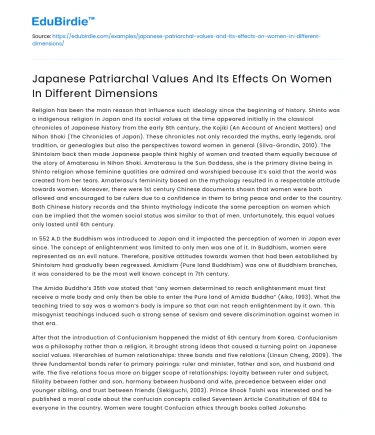Religion has been the main reason that influence such ideology since the beginning of history. Shinto was a indigenous religion in Japan and its social values at the time appeared initially in the classical chronicles of Japanese history from the early 8th century, the Kojiki (An Account of Ancient Matters) and Nihon Shoki (The Chronicles of Japan). These chronicles not only recorded the myths, early legends, oral tradition, or genealogies but also the perspectives toward women in general (Silva-Grondin, 2010). The Shintoism back then made Japanese people think highly of women and treated them equally because of the story of Amaterasu in Nihon Shoki. Amaterasu is the Sun Goddess, she is the primary divine being in Shinto religion whose feminine qualities are admired and worshiped because it’s said that the world was created from her tears. Amaterasu’s femininity based on the mythology resulted in a respectable attitude towards women. Moreover, there were 1st century Chinese documents shown that women were both allowed and encouraged to be rulers due to a confidence in them to bring peace and order to the country. Both Chinese history records and the Shinto mythology indicate the same perception on women which can be implied that the women social status was similar to that of men. Unfortunately, this equal values only lasted until 6th century.
In 552 A.D the Buddhism was introduced to Japan and it impacted the perception of women in Japan ever since. The concept of enlightenment was limited to only men was one of it. In Buddhism, women were represented as an evil nature. Therefore, positive attitudes towards women that had been established by Shintoism had gradually been regressed. Amidism (Pure land Buddhism) was one of Buddhism branches, it was considered to be the most well known concept in 7th century.
Save your time!
We can take care of your essay
- Proper editing and formatting
- Free revision, title page, and bibliography
- Flexible prices and money-back guarantee
The Amida Buddha’s 35th vow stated that “any women determined to reach enlightenment must first receive a male body and only then be able to enter the Pure land of Amida Buddha” (Aiko, 1993). What the teaching tried to say was a woman’s body is impure so that can not reach enlightenment by it own. This misogynist teachings induced such a strong sense of sexism and severe discrimination against women in that era.
After that the introduction of Confucianism happened the midst of 6th century from Korea. Confucianism was a philosophy rather than a religion, it brought strong ideas that caused a turning point on Japanese social values. Hierarchies of human relationships: three bonds and five relations (Linsun Cheng, 2009). The three fundamental bonds refer to primary pairings: ruler and minister, father and son, and husband and wife. The five relations focus more on bigger scope of relationships: loyalty between ruler and subject, filiality between father and son, harmony between husband and wife, precedence between elder and younger sibling, and trust between friends (Sekiguchi, 2003). Prince Shook Taishi was interested and he published a moral code about the confucian concepts called Seventeen Article Constitution of 604 to everyone in the country. Women were taught Confucian ethics through books called Jokunsho in Tokugawa Ieyasu period. Women were instructed to live according to the kafucho system or patriarch system which based on five constant values of Confucianism: benevolence,, justice, politeness, wisdom, and fidelity (Sugano, 2007). Additionally, there were an advocacy stated submissive wife and mother are the most honorable place of women in home. In Nara and Heian period, Ritsuryo law was enforced base on Confucian beliefs. There was a policy regarding expected behaviors in families: obedient grandchildren, righteous husbands, and virtuous wives.
Marriage is one thing that used to ensure the continuation of blood lines or even political alliances. It was common for daughters to get married into other families as a confirmation of relationships between two clans. Arranged married was normal at that time because they valued their clans’ name and reputation. Due to that, the heirs must go on to continue saving the clans. Onna daigaku (A text book in school) shown that education in early Japan also focused on preparing women for marriage. Marriage came with certain obligations, after marriage women are expected to bear a child not, also to look after of husband’s parents, and if a child was a boy, the mother must respect the son and raise him with fully care while if a child was a girl, she will not need to look after her that much unlike what she must do to a boy. The motherhood role in Japanese society endorsed women to believe that their complete devotion to their child is the greatest duty one woman must achieve in their life. Hence, they could bear any hardships just to caring a birth of their children. One of the hardships was Matahara or maternity harassment when a woman being fired. They will be convicted to leave their jobs if they get pregnant because it is believed that they will perform poorly in their work. Comes to think of it, women in patriarchal society do not even have lives of their own, they are expected to take a good care of everyone, to be virtuous, silent, good-mannered, and obedient.






 Stuck on your essay?
Stuck on your essay?

